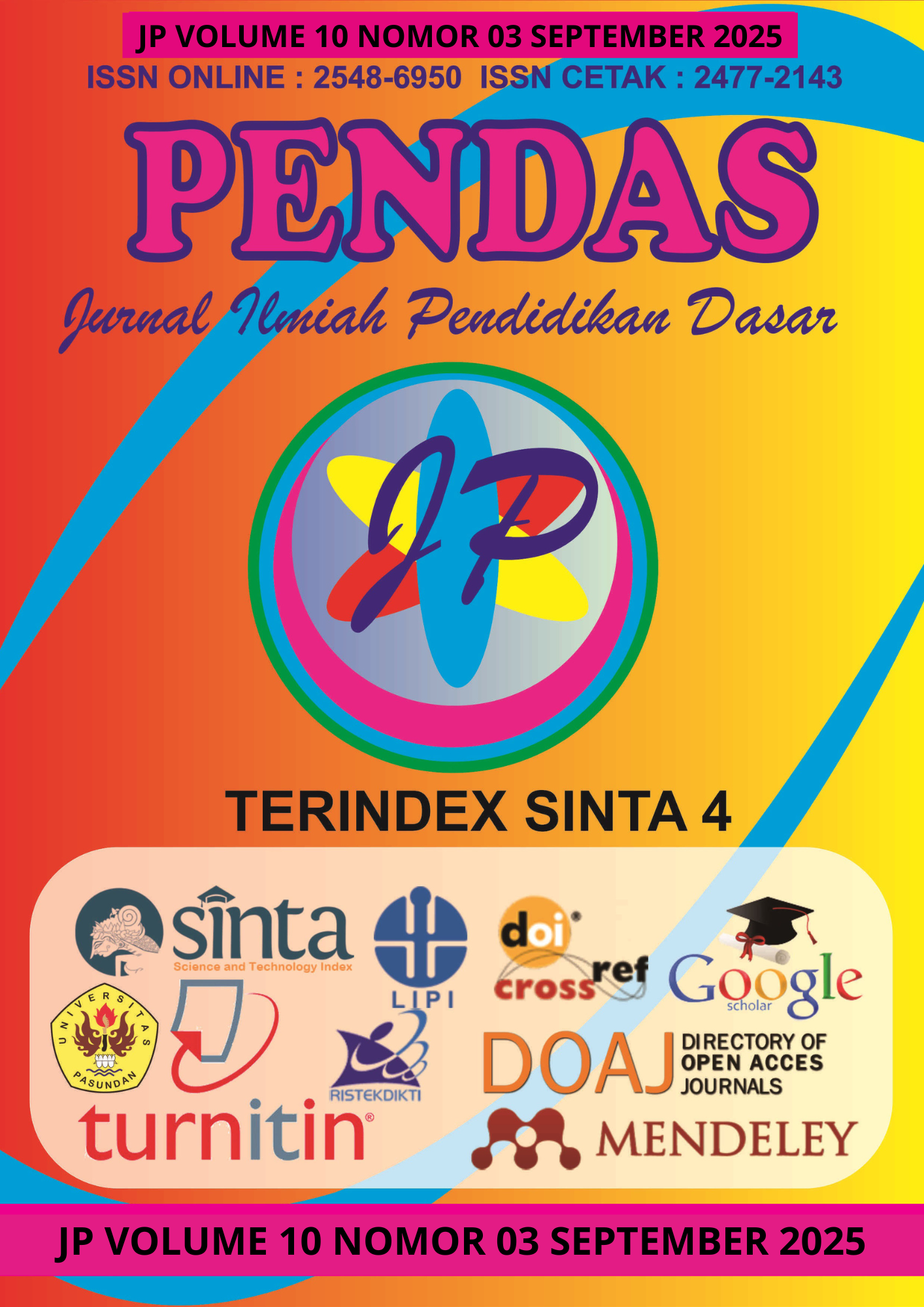UPAYA MENINGKATKAN HASIL BELAJAR PENDIDIKAN PANCASILA PADA MATERI GOTONG ROYONG MENGGUNAKAN MODEL PBL SISWA KELAS IV UPT SD NEGERI DOROMUKTI TUBAN
DOI:
https://doi.org/10.23969/jp.v10i3.29483Keywords:
learning outcomes, mutual cooperation, pancasila education, PBLAbstract
This study aims to improve student learning outcomes in Pancasila education subjects, especially in the material of mutual cooperation, by using the problem based learning (PBL) model. The research method used is classroom action research (PTK) with a quantitative and qualitative approach. The subjects of this study were students in one of the elementary/middle schools UPT SD Negeri Doromukti Tuban who had difficulty in understanding the concept of mutual cooperation in depth. In this learning process, two cycles were carried out, namely cycle 1 and cycle 2. Each cycle includes 4 stages, namely planning, implementation, observation, and reflection. The subjects of this study were teachers and 11 students of class IV UPT SD Negeri Doromukti Tuban. Data collection techniques used written tests. The results of the increase showed an increase from cycle 1 to cycle 2. In cycle 1, the results of the study were obtained from 5 students 45.5% were said to be incomplete while 6 students 54.5% were said to be complete were the average learning outcomes of class IV students. The results of this study indicate an increase in learning outcomes in students and efforts to improve the quality and quality of Indonesian education. connecting lesson materials with daily social interactions can improve understanding of the material more optimally in students.
Downloads
References
Adolph, R. (2016). No Title No Title No Title. 1–23. Ardianti, R., Sujarwanto, E., & Surahman, E. (2021). DIFFRACTION: Journal for Physics Education and Applied Physics Problem-based Learning: Apa dan Bagaimana. DIFFRACTION: Journal for Physics Education and Applied Physics, 3(1), 27–35. http://jurnal.unsil.ac.id/index.php/Diffraction
Assa Riswan. (2022). Jurnal Ilmiah Society. Faktor Penyebab Anak Putus Sekolah Di Desa Sonuo Kecamatan Bolangitang Barat Kabupaten Bolaang Mongondow Utara, 2(1), 1–12.
Aufarel, B., & Prasetyo, W. H. (2023). Peran Guru Pendidikan Pancasila Dan Kewargangeraan Dalam Menanggulangi Perilaku Kenakalan Remaja Di Smp Negeri 2 Teras Boyolali. Jurnal Lentera Pendidikan Pusat Penelitian Lppm Um Metro, 8(1), 1. https://doi.org/10.24127/jlpp.v8i1.2634.
Indrayani, S. A., Rahmadani, C., Saputra, R. H., Salsabila, B. L., Shofa, Z. N., & Islam, P. A. (2023). ORIENTASI PENDIDIKAN PANCASILA PERSPEKTIF. 1(November), 39–48.
Isma, N., & Yusuf, M. (2025). The Influence of the Implementation of Extracurricular Activities of the Islamic Propagation Agency on the Practice of Religious Worship a$t Mutia Rahma Bulu Cina Middle School , Hamparan Perak District. 5(1), 211–215. https://doi.org/10.30596/jcositte.v1i1.xxxx
Khakim, N., Mela Santi, N., Bahrul U S, A., Putri, E., & Fauzi, A. (2022). Penerapan Model Pembelajaran Problem Based Learning Dalam Meningkatkan Motivasi Belajar PPKn Di SMP YAKPI 1 DKI Jaya. Jurnal Citizenship Virtues, 2(2), 347–358. https://doi.org/10.37640/jcv.v2i2.1506
Rachmawati, N. Y., & Rosy, B. (2020). Pengaruh Model Pembelajaran Problem Based Learning (PBL) terhadap Kemampuan Berpikir Kritis dan Pemecahan Masalah pada Mata Pelajaran Administrasi Umum Kelas X OTKP di SMK Negeri 10 Surabaya. Jurnal Pendidikan Administrasi Perkantoran (JPAP), 9(2), 246–259. https://doi.org/10.26740/jpap.v9n2.p246-259
Ra$hman, A., Munandar, S. A., Fitriani, A., Karlina, Y., & Yumriani. (2022). Pengertian Pendidikan, Ilmu Pendidikan dan Unsur-Unsur Pendidikan. Al Urwatul Wutsqa: Kajian Pendidikan Islam, 2(1), 1–8.
Ramadhani. (2019). Metode Penerapan Model Problem Based Learning (PBL). Lantanida Journal, 7(1), 75–86.
Ramdani, F., Muhammad, ;, Ulwan, N., Larasati, ;, Arief, A., Muhamad, ;, Al-Farisi, F., Rochiman, R., Muhammad, ; R, Nuryaddin, N., Kogoya, A., Yayang, ;, & Furnamasari, F. (2021). Pentingnya Pendidikan Pancasila Dalam Membangun Kesadaran Identitas Nasional Dan Semangat Cinta Tanah Air Pada Mahasiswa. Bahasa Dan Ilmu Sosial, 2(3), 282–296. https://doi.org/10.61132/nakula.v2i3.858
Syawaly, A. M., & Hayun, M. (2020). Pengaruh Penerapan Model Pembeljaran Problem Based Learning Terhadap Kemampuan Representasi Matematis Siswa Sekolah Dasar. Instruksional, 2(1), 10. https://doi.org/10.24853/instruksional.2.1.10-16.
Ujud, S., Nur, T. D., Yusuf, Y., Saibi, N., & Ra$mli, M. R. (2023). Penerapan Model Pembelajaran Discovery Learning Untuk Meningkatkan Hasil Belajar Siswa Sma Negeri 10 Kota Kota Ternate Kelas X Pada Materi Pencemaran Lingkungan. Jurnal Bioedukasi, 6(2), 337–347. https://doi.org/10.33387/bioedu.v6i2.7305
Utomo, P., Asvio, N., & Prayogi, F. (2024). Metode Penelitian Tindakan Kelas (PTK): Panduan Praktis untuk Guru dan Mahasiswa di Institusi Pendidikan. Pubmedia Jurnal Penelitian Tindakan Kelas Indonesia, 1(4), 19. https://doi.org/10.47134/ptk.v1i4.821
Yudia$ Fa$uzi, F., A$ria$nto, I., & Soliha$tin, E. (2013). Peran Guru Pendidikan Pancasila dan Kewarganegaraan dalam Upaya Pembentukan Karakter Peserta Didik. Ppkn Unj Online, 1, 1–15. http://skripsippknunj.org
Yulianti, E., & Astimar, N. (2023). Peningkatan Hasil Belajar Tematik Terpadu Menggunakan Model Problem Based Learning di Sekolah Dasar. E-Jurnal Inovasi Pembelajaran Sekolah Dasar, 10(3), 352. https://doi.org/10.24036/e-jipsd.v10i3.10457
Downloads
Published
Issue
Section
License
Copyright (c) 2025 Pendas : Jurnal Ilmiah Pendidikan Dasar

This work is licensed under a Creative Commons Attribution 4.0 International License.














































